Ranked! The 21 biggest World Cup shocks EVER
As Saudi Arabia humble Argentina, Nick Miller counts down the most jaw-dropping events from the world's greatest football tournament

The best features, fun and footballing quizzes, straight to your inbox every week.
You are now subscribed
Your newsletter sign-up was successful
Want to add more newsletters?

Five times a week
FourFourTwo Daily
Fantastic football content straight to your inbox! From the latest transfer news, quizzes, videos, features and interviews with the biggest names in the game, plus lots more.

Once a week
...And it’s LIVE!
Sign up to our FREE live football newsletter, tracking all of the biggest games available to watch on the device of your choice. Never miss a kick-off!
Join the club
Get full access to premium articles, exclusive features and a growing list of member rewards.
Saudi Arabia have pulled off one the biggest World Cup shocks of all time with a 2-1 win over Argentina.
Lionel Messi gave Argentina an early lead from the penalty spot – and his side netted a further three first-half goals that were all chalked off for offside, leaving viewers convinced that we were in store for a Saudi shellacking.
But an incredible second-half performance saw Saudi Arabia nab two goals from Saleh Alshehri and Salem Aldawsari with over half an hour still to play.
Incredibly they held on – even through the 14 minutes of added time, to deliver one of the most incredible upsets we've ever seen on the biggest stage of all.
We're still reeling from the result. While we work out where it should go on the list, why don't you reacquaint yourselves with the 21 other biggest World Cup shocks ever...
21. Portugal vs Holland (2006)
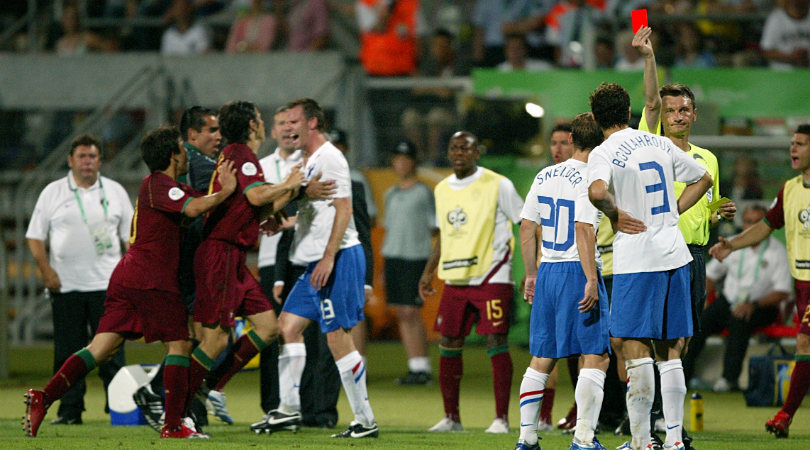
The Battle of Santiago (more on that later) would almost certainly have been abandoned as a violent farce if it was played today, so comparing it to modern games is a bit of a futile exercise. But the 2006 last-16 clash between Portugal and Holland featured a similar amount of spice.
Mark van Bommel, as you might expect, quite literally kicked things off with a booking in the second minute – the first of 16 yellow cards dished out during the game. Four players - Costinha, Deco, Giovanni van Bronckhorst and Khalid Boulahrouz - were sent off, and it was a miracle that others didn’t join them. Luis Figo, for example, got away with headbutting Van Bommel. Portugal won 1-0, but in truth everyone was probably glad just to get out of the game in one piece.
The best features, fun and footballing quizzes, straight to your inbox every week.
20. Roy Keane leaves the Ireland squad (2002)
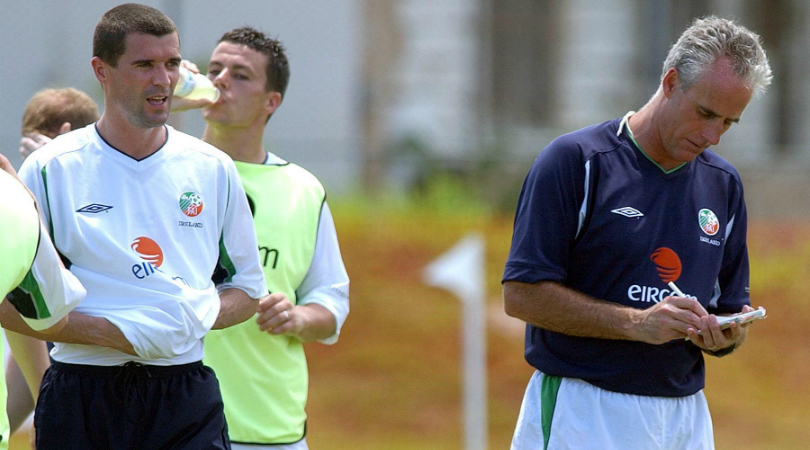
Talk to the right (or wrong) people in Ireland, and you’ll still find a healthy debate about who was right in Saipan: Roy Keane or Mick McCarthy. There remains debate about what actually happened, and even whether Keane was sent home or he walked out. What's fairly certain is that the midfielder, ever the perfectionist, was unhappy with the unprofessional nature of Ireland’s preparation; including, but not limited to, a rock-hard training pitch and their kit going AWOL.
Manager McCarthy then suggested in a team meeting that Keane had faked an injury to get out of an international fixture, and... well, that didn’t go down too smoothly. You probably know what was said by Keane next, but it’s worth repeating, in full:
“You’re a f***ing wanker. I didn’t rate you as a player, I don’t rate you as a manager and I don’t rate you as a person. You’re a f***ing wanker and you can stick your World Cup up your arse. I’ve got no respect for you. The only reason I have any dealings with you is that somehow you are the manager of my country. You can stick it up your bollocks.”
19. The stolen World Cup (1966)
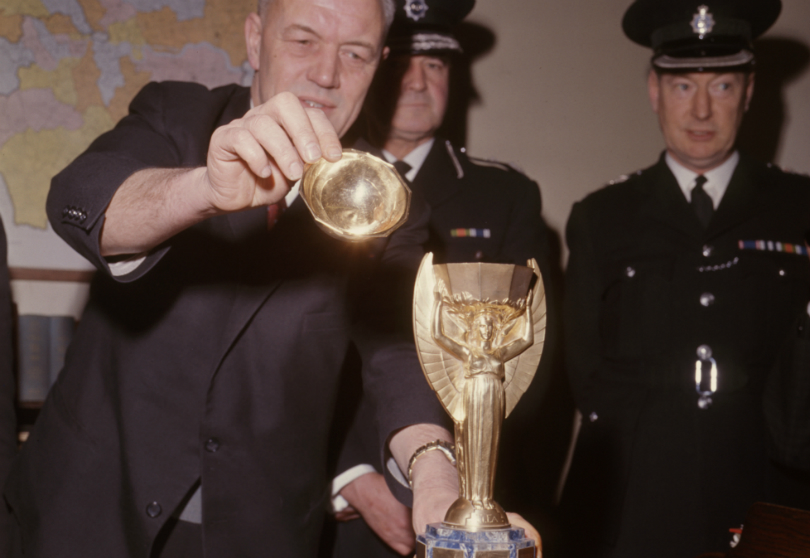
On reflection, releasing the Jules Rimet Trophy for display in a Westminster stamp exhibition in March 1966, just before the World Cup, perhaps wasn't the brightest move. While the exhibition was open, the cup was watched by two guards at all times. After closing time? Not so much.
One Sunday the trophy disappeared, the lax security provisions mysteriously breached, and for one week a farcical search continued. That's until David Corbett, resident of Norwood, south London, took his dog Pickles out for a walk. Pickles sniffed treasure underneath a bush; treasure which turned out to be the missing trophy. It’s never really been explained as to what the hell it was doing there, but the important thing was that the trophy was returned, available for Bobby Moore to lift later that summer.
18. Senegal vs France (2002)
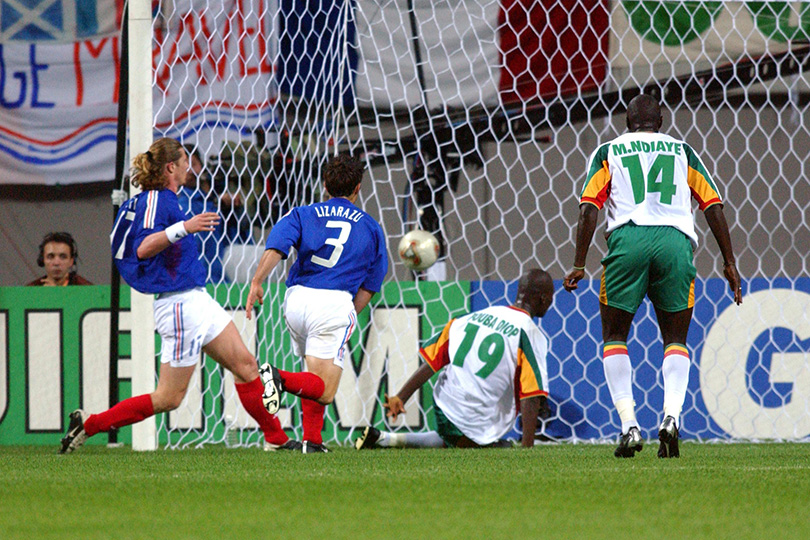
Should we have seen this coming? Should the hubris of the French team in 2002, defending world and European champions, have made this inevitable? Perhaps, but it was still an enormous shock when France, shorn of the injured Zinedine Zidane, were beaten by a Senegal team comprised entirely of hitherto mid-level players from the French league.
El Hadji Diouf made a mockery of the 34-year-old Frank Leboeuf, but it was midfielder Papa Bouba Diop who scrambled home the only goal. This was just the beginning of France’s humiliation, though, as they exited the tournament in the first round without scoring. "The Senegalese have had only one chance and they've scored,” sniffed Leboeuf. “On top of that it was a silly goal.”
17. France vs Kuwait (1982)
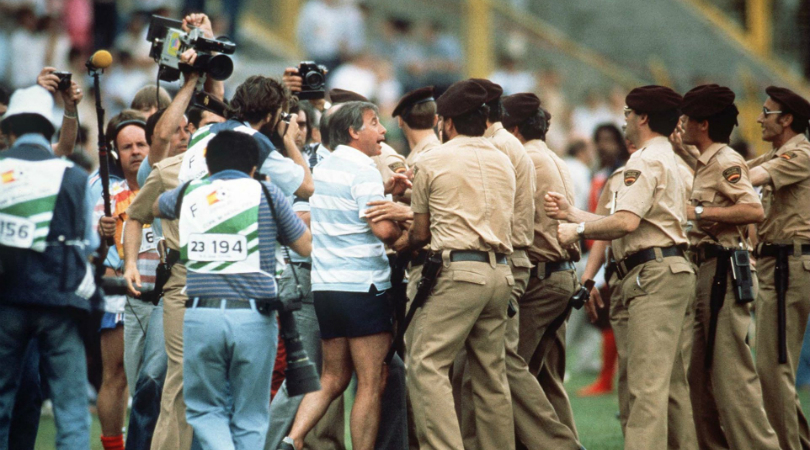
Kuwait have only ever played at one World Cup, and on this evidence they might be relieved about that. France were 3-1 up in this group game, coasting towards an expected victory when Alain Giresse found himself through on goal, no defender in sight. The Kuwait defenders had heard a whistle and, adhering to the first rule of Sunday league football, played to it. Alas, the shrill came from somewhere in the stands, not from the referee, and the players were understandably miffed when the unopposed Giresse scored.
Not half as miffed as Sheikh Fahad Al-Ahmad Al-Sabah, president of the Kuwait Football Association, though. He marched onto the pitch and told his players to leave unless the goal was chalked off. Remarkably, Russian referee Miroslav Stupar, perhaps in search of a quiet life, agreed and Giresse’s perfectly fine goal was disallowed. Not that it made much difference: Maxime Bossis made it 4-1 later anyway, France went through and Kuwait went out.
16. Geoff Hurst’s ‘goal’ is awarded (1966)
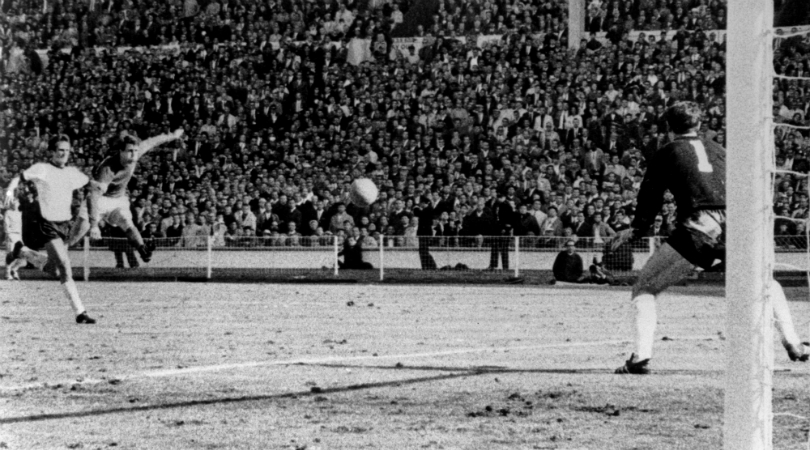
It wasn’t over the line. Obviously, it wasn’t over the line. The score was 2-2 in extra time of the 1966 World Cup Final against West Germany when Geoff Hurst spun and hammered his shot against the bar. It bounced down on the line, England protested, referee Gottfried Dienst referred to linesman Tofiq Bahramov, who nodded with certainty. Goal!
Bahramov later wrote that he thought the ball had actually hit the net, rather than the crossbar, which explained his decision – although the story that on his deathbed he said simply “Stalingrad” when asked about the goal is almost certainly a nonsense. Still, he is perhaps the only official to have a stadium named after him, in the Azerbaijani capital Baku.
15. Luis Suarez bites Giorgio Chiellini (2014)
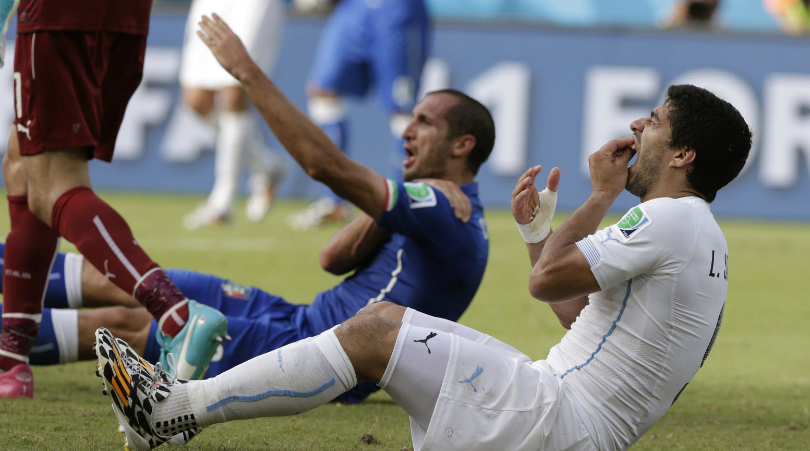
Before the 2014 World Cup, Suarez had gone on something of a PR campaign. “I want to change the bad boy image,” he told Sports Illustrated. “I don’t think I am at all how I've been portrayed.” And to prove his words weren’t idle, a few weeks later he bit an opponent on the football pitch for the third time.
With 11 minutes of Uruguay’s group game against Italy remaining, Suarez and Giorgio Chiellini tussled, and the Italian fell to the floor. Initially, few people were sure of what had happened, until Chiellini pulled aside his shirt to reveal bite marks. He’d done it again. Suarez was banned for nine international matches, all football for four months and fined 100,000 Swiss francs.
14. Italy vs North Korea (1966)
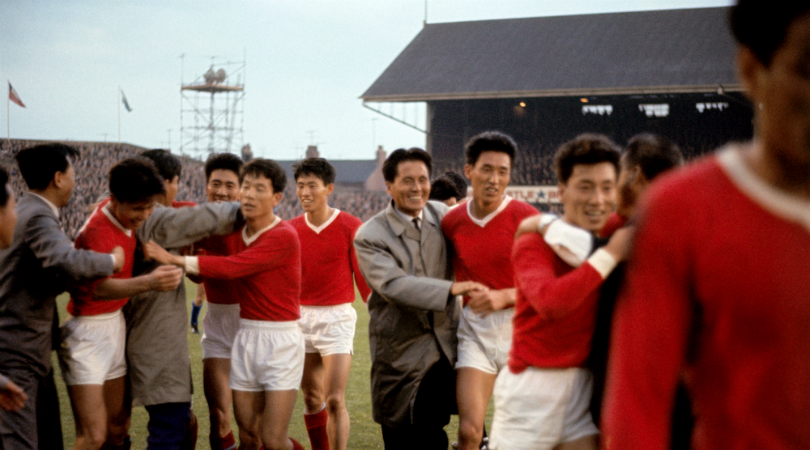
North Korea’s relationship with the rest of the world wasn’t always as rosy, problem-free, uncomplicated and stable as it currently is. In 1966, the country lacked diplomatic relations with many nations, but everyone adores an underdog story. So, after the North Koreans beat Italy at Ayresome Park in the 1966 World Cup, everyone loved them.
Huge shock though it was, Italy weren’t actually all that: despite their team being chock full of stars, they hadn’t progressed past the first round since winning the thing in 1938. After defeat to the USSR, Italy needed to beat Korea to progress, but a goal just before half-time from Pak Doo-ik was enough to send them out. "When I scored that goal the people of Middlesbrough took us to their hearts,” Pak said, years later.
13. Ronaldo nearly misses the World Cup final (1998)
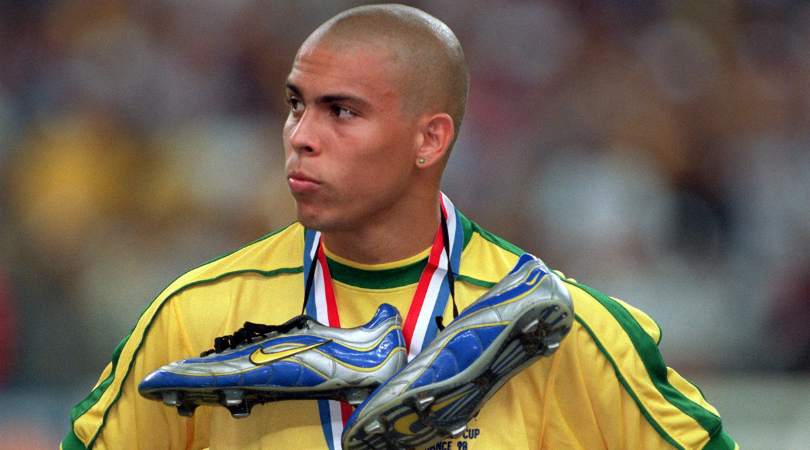
The 1998 World Cup should have been Ronaldo's moment: a phenomenal young player coming towards his peak, dominating the world. But the final didn’t go to plan. Over to the man himself, from FourFourTwo’s own film, to tell us what happened that day. "I decided to get some rest after lunch and the last thing I remember was going to bed," he recalls. "After that, I had a convulsion. I was surrounded by players and the late Dr Lidio Toledo was there... I was told I wasn’t going to play, but all the essential medical exams didn't show anything was abnormal – it was like nothing had happened.
“I approached [the manager Mario] Zagallo at the stadium and said: ‘I’m fine. I'm not feeling anything. Here are the test results, they’re fine. I want to play.’ I didn't give him an alternative. He had no choice and accepted my decision. Then I played and maybe I affected the whole team because that convulsion was certainly something very scary. It's not something you see every day.”
Brazil lost 3-0 to hosts France and Ronaldo was a shadow of himself... but his time would come.
12. Brazil 1-7 Germany (2014)
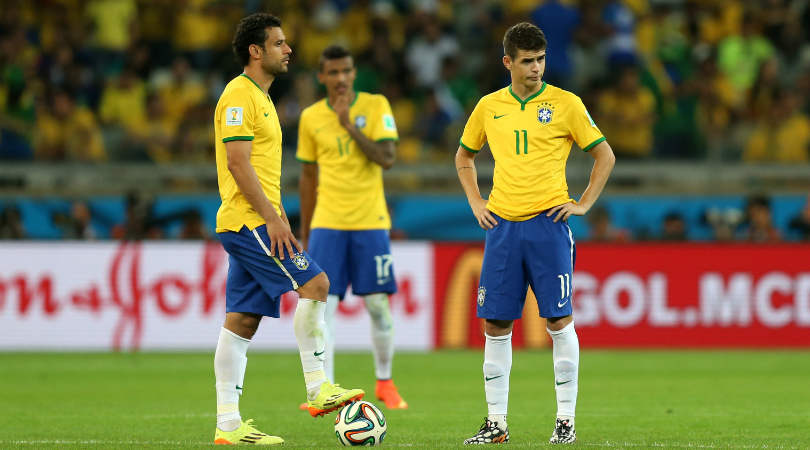
The tournament that was supposed to heal a 64-year-old national scar (see No.7 on this list) only ended up opening it even further. It was a bit like going to hospital to sort a chronic back problem only to slip and break your neck.
By the 25th minute of this 2014 World Cup semi-final, Germany were 5-0 up against the hosts. Half of the dazed Brazil team looked like they wanted to get off the pitch as quickly as possible to end the torture; half wanted to stay there forever to put off what would come next. "My message for the Brazilian people is to please excuse us for this performance," said manager Luiz Felipe Scolari, who described the eventual 7-1 defeat as “the worst day of my life”.
11. Zinedine Zidane headbutts Marco Materazzi (2006)
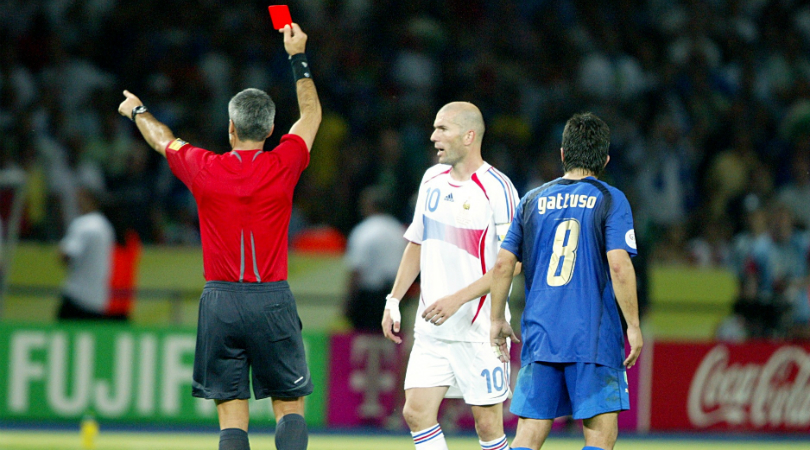
For a player with such delicate, dancing feet, Zidane made his most significant impact on World Cup finals with his head. In 1998, two headers won the tournament for France. But eight years later, with the end of his glorious playing career in sight, it was a slightly more aggressive intervention from his noggin.
Having already - just about - scored a Panenka penalty, the game was in extra time when Materazzi made a choice comment to his opponent. “What I said was stupid,” Materazzi told L’Equipe a few years ago, “but it didn’t deserve that reaction.”
To put this in family-friendly terms, it was a reference to Zidane’s sister that caused the French midfielder to plant a headbutt right in Materazzi’s chest. Zidane was - after a delay - sent off. Italy went on to win the penalty shootout and lift the World Cup. "If I ask him forgiveness, I lack respect for myself and for all those I hold dear with all my heart,” Zidane said in 2010. “It would be to dishonour me. I'd rather die.”
10. Mussolini’s Blackshirts win (1938)
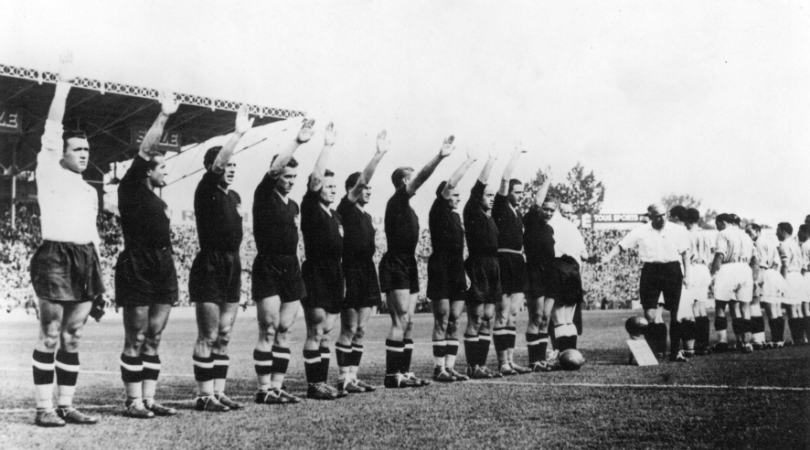
The potential for political propaganda in sport is almost as old as sport itself. Benito Mussolini had his feet well and truly under the table as Italy’s dictator by the time that the 1938 World Cup in France rolled around. Italy, the defending champions, had a chance to win on foreign soil and Mussolini saw the chance for a piping-hot nationalistic display of superiority.
Anti-fascist protests were rumbling in those pre-war days, but Mussolini was determined that Italy would win – and win with the Fascio Littorio (the fascist emblem) on their shirts. In terms of symbolism, an Italy team wearing black shirts (their away strip for the tournament, worn on instruction from Mussolini) and doing a fascist salute before games, couldn’t really be beaten for Il Duce.
Italy won the final, beating Hungary 4-2. The story goes that Mussolini sent the team a telegram before the final which included the motivational line: “Win or die.” The veracity of that tale has been doubted, but the reason myths like that take hold is because they’re easily believable.
9. West Germany vs Austria (1982)
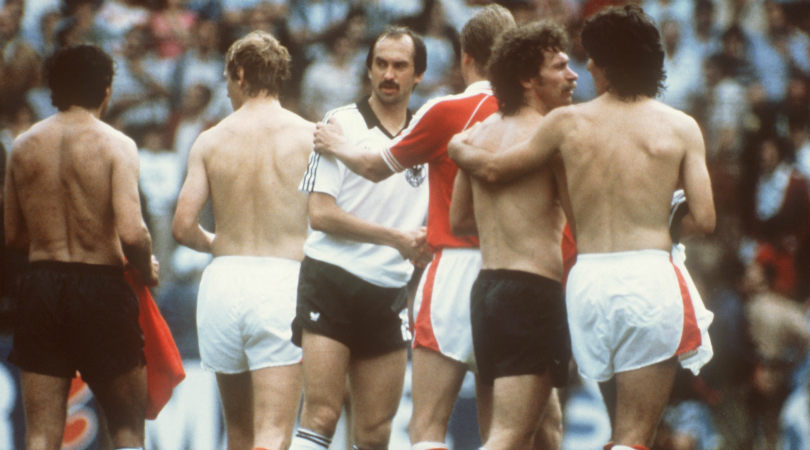
Subtlety is key when you’re contriving a result. Don’t make it look too obvious. That’s not something that West Germany and Austria seemed too concerned about in 1982, when one particular result turned out to be most convenient for both sides. A 1-0 win for the West Germans in the final Group 2 game in Gijon would see both sides qualify for the second phase, eliminating an Algeria team that had shocked Germany with a 2-1 win in the opening game.
Horst Hrubesch scored in the 11th minute, and while the popular image of a game with two teams passing it sideways until they were allowed to stop isn’t quite right, it was clear by the final quarter that both sides settled for the convenient result. This game went by many names: the Anschluss Game, the Disgrace of Gijon, or - the most fun - Nichtangriffspakt von Gijón (the Non-Aggression Pact of Gijon).
8. Cameroon vs Argentina (1990)
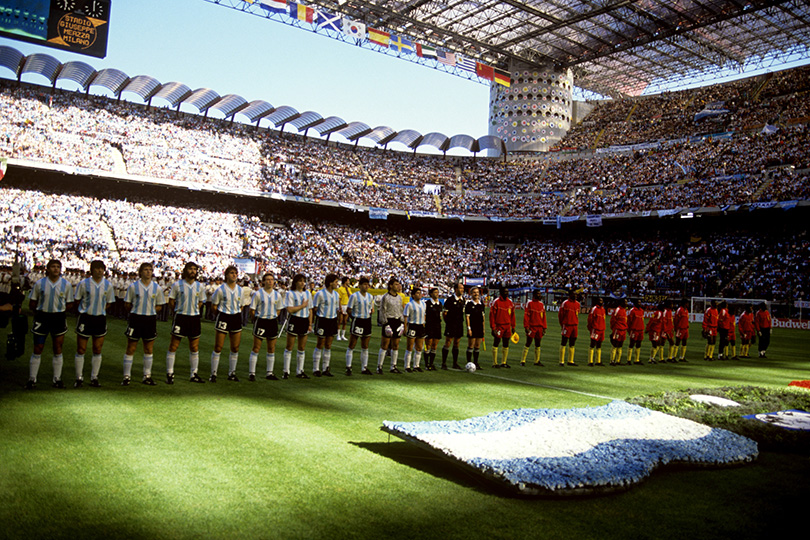
Even if Cameroon’s preparations for the 1990 World Cup had been perfect, this would have been an extraordinary result. But they were a shambles in the lead-up to the tournament, losing to assorted club teams in preparatory friendlies, rife with arguments and with a manager who nearly got the sack.
However, in the tournament’s Milan opener, Cameroon somehow defeated the reigning champions. Francois Omam-Biyik’s weak header squirted through Nery Pumpido’s hands, which then allowed Cameroon to go about the real business of the day: booting Argentine players as high in the air as possible.
The ‘highlight’ was Benjamin Massing’s assault on Claudio Caniggia, his intention memorably described in Pete Davies's All Played Out as "not so much to break Caniggia’s legs, as actually to separate them from the rest of his body". Massing picked up a yellow card.
7. Brazil vs Uruguay (1950)
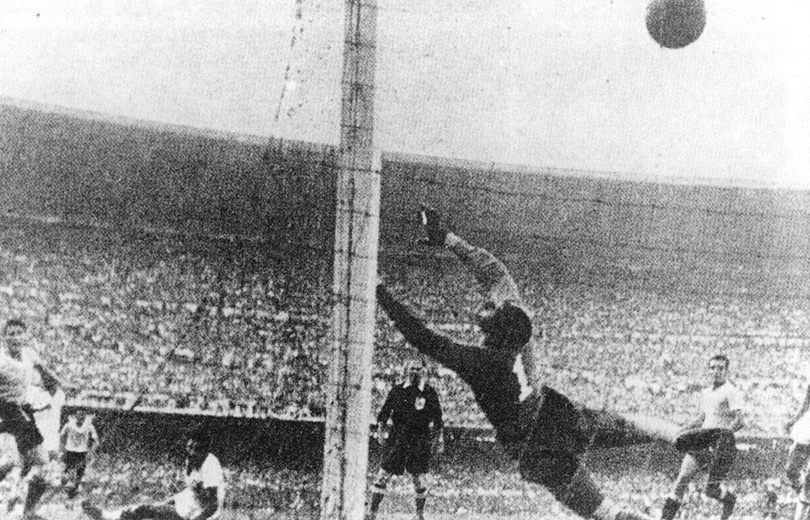
The story goes that Moacir Barbosa, Brazil’s goalkeeper at the 1950 World Cup, held a barbecue at some point in the 1960s. A guest asked what the large pieces of wood that were burning to cook the meat were. They were, Barbosa said, the posts from the final match of that World Cup, which some misguided soul had given to him for reasons unclear.
Hosts Brazil weren’t so much expected to beat Uruguay to win that tournament, more it was written; fate; an inevitability. A Rio newspaper printed a photo of the team saying: “These are the world champions.” But despite Friaça giving Brazil the lead, Uruguay came back through Juan Alberto Schiaffino, and then in the closing stages, an Alcides Ghiggia shot crept under Barbosa. Cue national hysteria, mourning and humiliation.
6. Schumacher vs Battiston (1982)
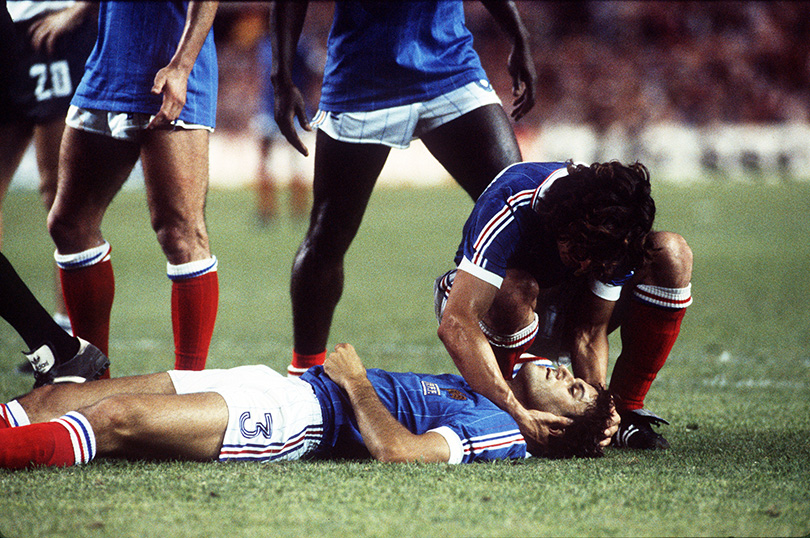
Harald ‘Toni’ Schumacher’s book Blowing The Whistle, published in 1987, is an illuminating read for a number of reasons. Not least his assertion that frankly, in his 'collision’ with Patrick Battiston in the semi-final of the 1982 World Cup, he did the Frenchman a favour. Painting his assault as the sort of workaday aggression any goalkeeper is capable of, Schumacher describes twisting around in the air so he struck Battiston with his hip and backside.
"If I’d collided with him head on, it would have been worse for him," Schumacher wrote. He also said that his post-game quip where, after being told the news that Battiston had lost two teeth, he said: 'If that’s all that’s wrong with him, I’ll pay to have them crowned' was a stupid remark borne of relief that the injury wasn’t more serious. Medics had to administer oxygen to the unconscious Battison. The referee awarded Schumacher a goal-kick.
5. USA vs England (1950)
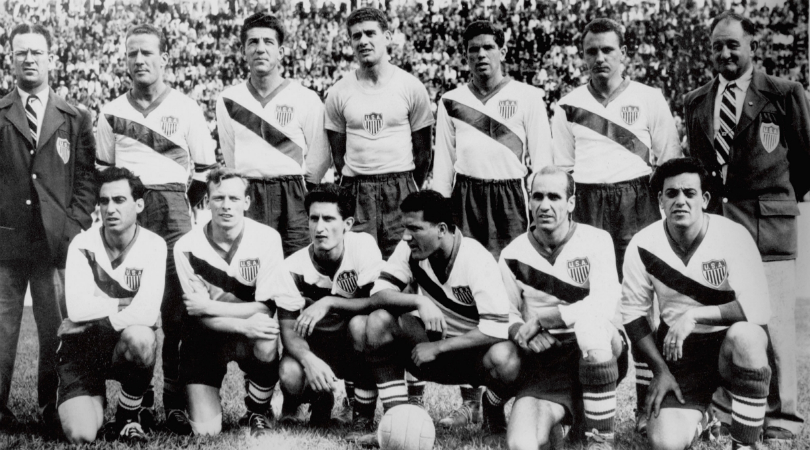
The story, almost certainly apocryphal, has been told many times: this result was such a shock that some newspapers assumed the wire report of a 1-0 final score was a typo, and instead told that England had won 10-0.
True or not, this was the biggest World Cup upset up to that point – an English team featuring Stan Mortensen, Tom Finney, Billy Wright and Roy Bentley, beaten by a ragtag American bunch, most of whom weren’t professionals and some of whom weren’t American.
The goalscorer Joe Gaetjens, born in Haiti and who moved to New York to study at Columbia University three years earlier, washed dishes in a restaurant and only signed a ‘letter of intention’ to become a US citizen – an intention he didn’t actually carry out. The Daily Express, who before the game had suggested that the U.S. be given a three-goal start to make things interesting, called the loss “the lowest ever for British sport”.
4. The Miracle of Bern (1954)
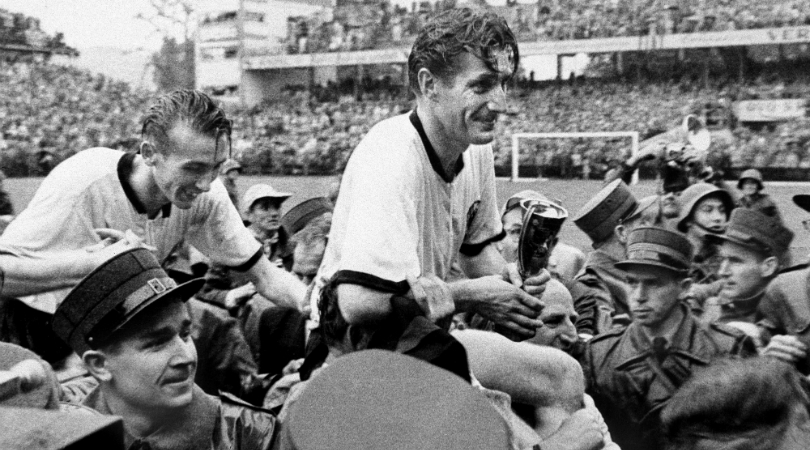
It’s worth remembering that, two weeks before the 1954 World Cup Final, the brilliant Hungary team of Ferenc Puskas, Sandor Kocsis, Nandor Hidegkuti beat West Germany 8-3. A hammering, and not an unexpected one - and when both teams reached the final, a repeat was expected.
And yet: Puskas was famously half-fit (at best) after a reducer from Werner Liebrich in that first game fractured his ankle; a village fair outside their hotel had disrupted Hungary's sleep the night before the final; the rain was torrential, and the Germans wore revolutionary screw-in studs on their boots, helping them on the sodden turf. Still, Hungary went 2-0 up inside eight minutes, so all seemed to be going to plan – only for the Germans to level through Max Morlock and Helmut Rahn by 18 minutes.
Then, with six minutes remaining, Rahn drove home a third, and this brilliant Hungary team would never win a major title. Years later, a study concluded that ‘vitamins’ issued to the Germans actually contained the methamphetamine Pervitin. Perhaps not such a miracle after all.
3. The Battle of Santiago (1962)
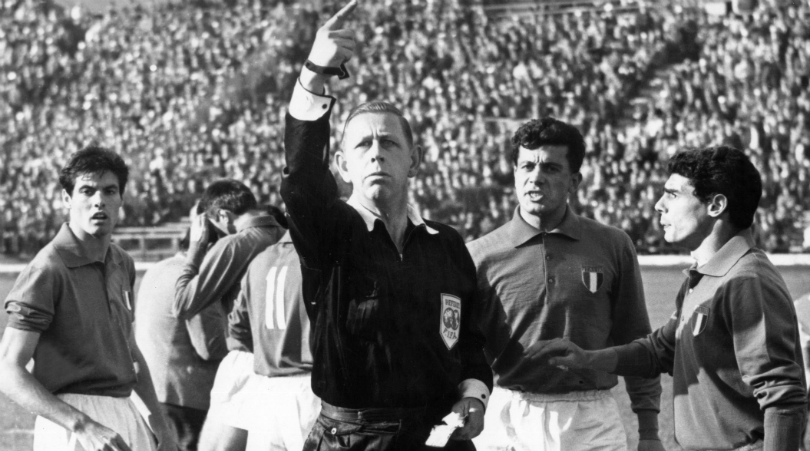
“Good evening,” began David Coleman, introducing the highlights of Chile’s group game against Italy in the 1962 World Cup. “The game you are about to see is the most stupid, appalling, disgusting and disgraceful exhibition of football in the history of the game. This is the first time these countries have met; we hope it will be the last.”
The first sending-off came after 12 minutes: Giorgio Ferrini initially refused to leave the pitch, and it went downhill from there. Leonel Sanchez broke Italy captain Humberto Maschio’s nose, then landed one on Mario David, who was dismissed for retaliating. In the end, the miracle was that only two men were sent off; referee Kenneth Aston was rather overwhelmed by the whole affair. Oh, by the way: Chile won 2-0.
2. The death of Andres Escobar (1994)
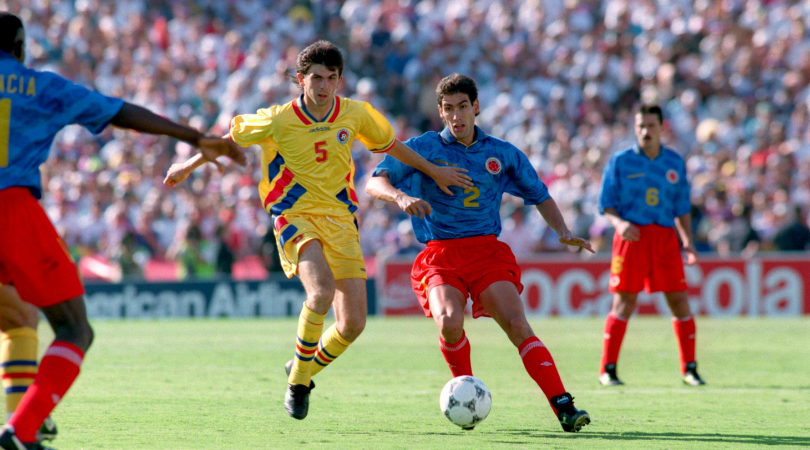
The intertwining of Colombia’s national football team with organised crime was always likely to end in tragedy. Much-fancied before the 1994 World Cup, they were eliminated in the first round, partly because of a defeat to the USA in which Andres Escobar scored a hideously unlucky own goal.
Upon the team's return, Escobar was in a Medellin nightclub when some men tried to provoke him. Rather than react, he chose to go home. As he sat in his car, three men approached and two of them shot him six times. Humberto Castro Munoz, linked to a drug cartel, confessed to Escobar's murder which was widely believed to be punishment for his own goal. An estimated 120,000 people attended the defender's funeral.
1. The Hand of God (1986)
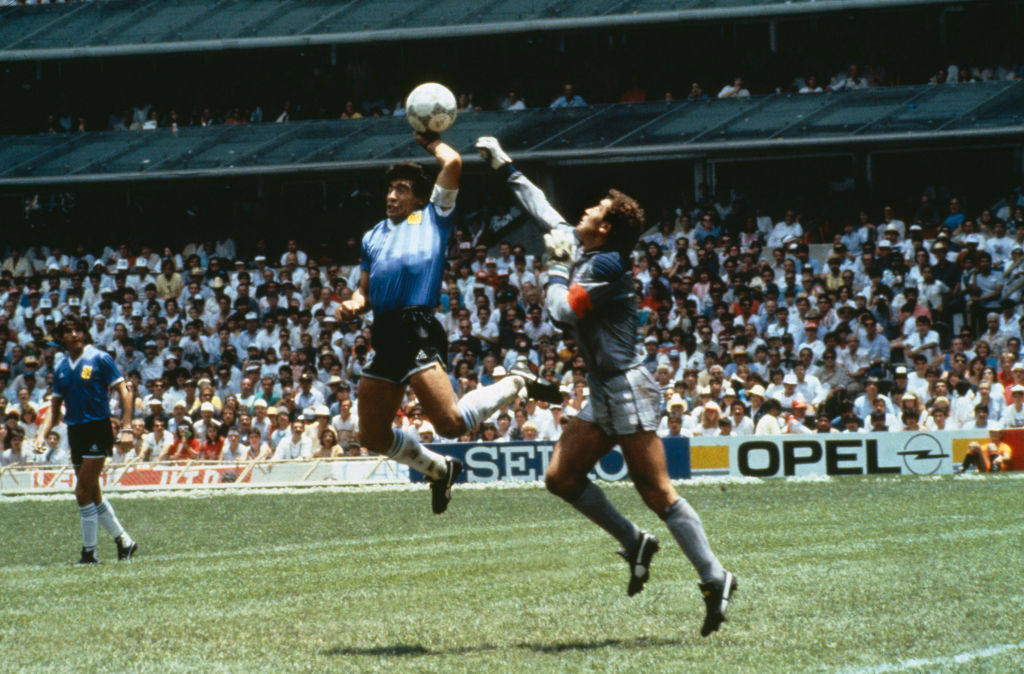
If you were wondering, in the 32 years since the 1986 World Cup quarter-final, whether Diego Maradona has any regrets about his first goal against England? Well, unsurprisingly not.
"For me, it was like stealing from a thief. Not a crime at all," he wrote in Touched By God, his book about that tournament. And in many ways, it would be a shame if Maradona did regret it, ruining the image of this whirling genius who didn’t give a flying one about anybody – especially not the English. His handball put Argentina 1-0 up, before a goal breathtaking for all of the right reasons made it 2-0 just minutes later.
"When El Checho [Sergio Batista] came over," Maradona wrote, about celebrating the goal, "He asked me: 'You knocked it in with your hand, right? Did you use your hand?' And I answered, 'Shut the f**k up and keep on celebrating'.
- Conor PopeOnline Editor
 Join The Club
Join The Club










